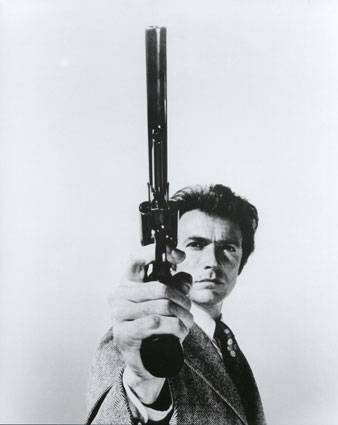 Clint Eastwood retired, at least from his work in front of the camera, with last year’s/last month’s Gran Torino, by all accounts a spectacular film about a septuagenarian kicking butt. Eastwood is 78, and we may never indeed hear his gruff voice in the movie theater again; but considering his mother just died two years ago at the age of 97 and Clint is still walking around like he’s got business to take care of, I wouldn’t be surprised if he attempts a Jay-Z-esque “comeback” in a few years. Dirty Harry 6? Please?
Clint Eastwood retired, at least from his work in front of the camera, with last year’s/last month’s Gran Torino, by all accounts a spectacular film about a septuagenarian kicking butt. Eastwood is 78, and we may never indeed hear his gruff voice in the movie theater again; but considering his mother just died two years ago at the age of 97 and Clint is still walking around like he’s got business to take care of, I wouldn’t be surprised if he attempts a Jay-Z-esque “comeback” in a few years. Dirty Harry 6? Please?
Anyway, in remembrance of a wonderful career peppered with bullet holes, reactionary politics, and chimpanzees, I’d like to look back at the early filmic career of one of the greatest actor-directors. Eastwood was the last star made by the most purely American of cinematic forms, the Western. Finding his initial fame on the television show Rawhide, his breakout film hits was ironically a trio of Westerns made in Italy and Spain, which initiated the genre now known as Spaghetti Westerns. Directed by Sergio Leone, an auteur who compressed his genius into a mere six solo-directed films, A Fistful of Dollars (1964), For a Few Dollars More (1965), and The Good, the Bad, and the Ugly (1967) were at once intelligent comments on the myth of the Western and really freaking awesome.
Eastwood was already in his late thirties by the time The Good, the Bad, and the Ugly came out. But by that time he was well on his way to becoming the biggest star in the world, a position he would use to explore his singing and animal-wrangling skills. But for all his Dirty Harrying and his attempts to resuscitate the dying Western (with his more valiant attempts including High Plains Drifter (1973) and Unforgiven (1991), both of which he directed), Eastwood was never as essentially Eastwood as he was when he played The Man With No Name in Leone’s trilogy.
The stylized violence of these films seems almost realistic in the days of Tarantino and the Wachowski Brothers, but it was Leone, an Italian, who invented the exaggerated stand-off duel popular culture imagines as symptomatic of the Western genre as a whole. (Ennio Morriconne, the films’ composer, wrote the music now aped in most parodies of the Western.) This stylistic abundance derived at least in some part from the attributes of the main character, a role for which Eastwood was perfectly suited. The first film was a remake of Akira Kurosawa’s own love letter to the American Western, Yojimbo (Bodyguard, 1961), transplanting the ruthless, brooding samurai character into the American West and upping his ruthlessness and brooding.
The role didn’t demand a lot from Eastwood other than grimacing, squinting, chewing a lot of cigarillos, and uttering the occasional witty threat. But his spectacular squint, grimace, and growl in films full of close-ups lend gravitas and intensity to what could, with the wrong actor, come off as a laughable but interesting lesson in editing technique. From the first scene in the three films where a confrontation leads to a shoot-out, you know Eastwood’s wandering gunslinger-samurai means business.
So goodbye, Clint. We’ll miss you shooting things and looking mean.
New Releases From the Box
W.
OK, I’ll be honest. I haven’t really watched this week’s new releases. But considering this film’s lukewarm reception, its obvious (and pretentious) Oscar aspirations, and the fact that it’s helmed by the winner of Pat’s Least Favorite Acclaimed Director of All Time Award, Oliver Stone, I think I’ll probably avoid it. What can this film tell me? That George W. Bush is a fun-loving, relatable party boy who ended up in a place he has no business being in and is surrounded by people so absurdly corrupt and power hungry that it would be funny if it hadn’t nearly ruined our nation? Thanks, Oliver. I never thought of that. You’re a genius.
Nights in Rodanthe
There are some stars who languish as C-level stars for a while, make huge comebacks, and then seem determined to fight their way back to C-level. Diane Lane is one of these stars. Richard Gere may be another. They are both in this film.
Soul Men
I don’t know. Isaac Hayes and Bernie Mac are dead and everything, but why not just put your copy of “Hot Buttered Soul” on the turntable and rent The Original Kings of Comedy instead?
Miracle at St. Anna
A relatively mainstream World War II movie about black soldiers in Italy? This must have been one of the most important films of the … oh. Might still be worth a look though, if just for an appreciation of what the film is trying to say.
Frozen River
Well, it was nominated for an Oscar or two, so it might be really good. Or it could be another digital manipulation-reliant, humorless remake of Forrest Gump. Maybe I should start at least researching these titles before writing about them.
Next Week on From the Box
A movie the author has seen, Religulous, is released, so he can tell you just how much of an irresistibly funny, smug asshole Bill Maher is. Elsewhere, High School Musical 3 descends upon the masses, Chuck Palahniuk is bastardized (Choke), and Russell Crowe’s capitalized Method of either gaining or losing a dramatic amount of weight backfires as an acting strategy with Body of Lies.








